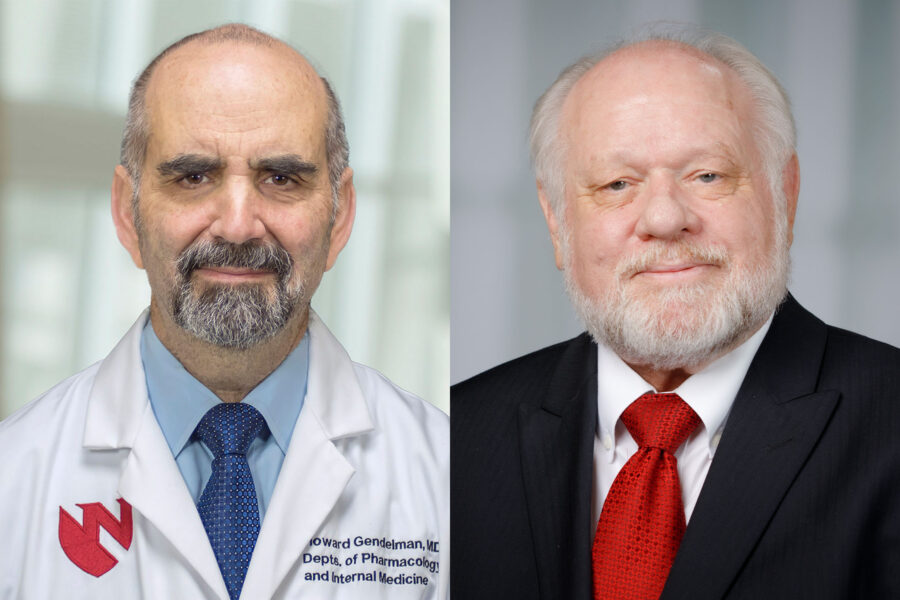An innovative approach to treat Parkinson’s disease, pioneered at UNMC, could reach patients within the next year as part of a clinical trial.
Howard Gendelman, MD, and Lee Mosley, PhD, initially identified ld-IL-2 monotherapy — short for low dose interleukin-2 — as a potential treatment for Parkinson’s disease. At the same time, Coya Therapeutics was pioneering work with ld-IL-2 to target multiple neurodegenerative conditions and had generated highly promising clinical data in ALS and Alzheimer’s disease. The promising data generated by UNMC in Parkinson’s disease led to a licensing partnership with Coya.
UNMC experiments showed that ld-IL-2 can be particularly effective for use in patients suffering from Parkinson’s. In a recent publication, Dr. Gendelman, chair of the UNMC Department of Pharmacology and Experimental Neuroscience (PEN), and Dr. Mosley, a professor and director of the neurodegenerative disease program in UNMC’s PEN department, report that ld-IL-2 stimulates a robust anti-inflammatory response with regulatory T-cells, or Tregs, which can protect brain cells from the kind of damage found in Parkinson’s.
In June 2023, UNMC’s technology transfer office, UNeMed, licensed the intellectual property relating to the use of ld-IL-2 to Coya Therapeutics for further development and commercialization in Parkinson’s disease.
Dr. Gendelman extended the research with ld-IL2 to combination approaches with another cytokine, granulocyte macrophage-colony stimulating factor, or GM-CSF. GM-CSF is a potent immune modulator known to promote Treg activities and dampen pro-inflammatory responses. Preclinical data — generated by the Gendelman and Mosley laboratories — demonstrated that the combination of ld-IL-2 with GM-CSF resulted in a synergistic four- to six-fold increase in Tregs compared to treatments with either cytokine alone.
Earlier this month, UNeMed additionally licensed the use of ld-IL-2/GM-CSF to Coya Therapeutics for further development and commercialization in multiple inflammatory diseases, including neurodegenerative and autoimmune conditions.
“We believe that Treg dysfunction is the common thread that binds together many neurodegenerative diseases,” Coya Chief Business Officer, Arun Swaminathan, PhD, said in a recent press release. “These two licenses are based on strong preclinical animal data and builds upon the highly promising clinical data observed in ALS and AD, and expands the optionality that Coya has in strategic partnering discussions to execute on future clinical trials in Parkinson’s disease.”
Said UNeMed President and CEO, Michael Dixon, PhD: “We are incredibility excited about this partnership. Coya is in a great position to develop this new therapy and bring it to the market, where it can have a significantly positive impact on health care.”

Congratulations! So happy that your hard work and dedication to fighting this disease is moving forward.
Congratulations to Drs. Gendelman and Mosley!
Congratulations to Drs. Gendelman, Mosley and the team.
Congratulations to Drs. Gendelman, Mosley and the team!
Congrats on another historic accomplishment. You make us all proud – keep it going!
The goal of each biomedical researcher here and much beyond is for inventions to make a broad difference towards improving the health and well-being of the many. What Lee and I have been working on is just a baby step. UNeMED, our collaborators and students, and of course the UNMC administration are the ones who can make those baby steps into leaps. For that, we are so grateful. Will see where this journey goes next?
Howie, wonderful!!
Congrats Dr. Gendelman and Dr. Mosley!